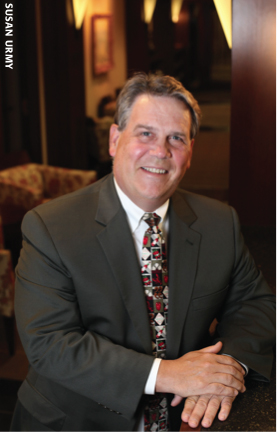Wright Pinson
 Wright Pinson, MBA, M.D.
Wright Pinson, MBA, M.D.
Deputy Vice Chancellor for Health Affairs and CEO of the Vanderbilt Health System
What are the major changes that you think will come to Vanderbilt and the Medical Center over the next 10 years?
The first thing is, there is always a flow of advances that come from our basic research and clinical research and this will continue as it has in the past. However, I think you will see more focus on the process of delivery of care. The clinical enterprise itself will become even more of a laboratory.
The second thing is the financial circumstances around health care are changing dramatically. There has been increasing growth of health care expenditure for many decades in the United States, but between the total debt and the annual deficit and the budget response that is going to be required, this will not go on. We are at an inflection point. We might see steady funding, but what’s more likely is some level of decreased funding. It’s going to be interesting to see whether the decreased funding is limited or whether it’s draconian, but either way this business is going to change.
Third, with that economic picture in view, I predict a major change you’re going to see is networks of hospitals and doctors developing. I’ve heard it likened to the change in the airlines: when fuel prices went up dramatically, all these competing airlines linked up into three or four major networks around the world and started sharing reservations, equipment and routes. Well, I predict that there will be two or three major chains of hospitals and doctors in each metropolitan area, and eventually chains from different cities will link up. And I wouldn’t be surprised to see those links cross state lines. So a change for us at Vanderbilt is that our horizon has to get much larger. We have thought of our clinical care as being right here in our facilities. In the future I think that we are going to participate in a system, and collectively in that system we are going to worry about people’s lives and health care in a more integrated fashion. We may see some of those patients come here for quaternary care, but we will also be thinking about how care is delivered in the community. We will be concerned about how medicine is practiced across a service area by multiple hospitals and doctors. We’ll be worried about transferring medical information throughout that system. We are going to have to think not just about what we do here, but about what goes on all around us. And the larger that network gets, of course, the bigger the horizon gets.
Where do you see the seeds of those changes now?
We have multiple innovation projects going on and I think those will come to fruition. My Health at Vanderbilt provides a whole different way of communicating with patients. My Health Team at Vanderbilt is a new way of taking care of patients, using digital transmission of data. Diagnostic management teams would be another very good example.
I think you will see these alternative forms of practice being more and more embraced, and applied to the care of patients. I think you will see us export some of our methods of care that have come to fruition from our innovation teams.
What are the biggest obstacles or challenges Vanderbilt and the Medical Center will face in the next 10 years?
I think the biggest obstacle that we’re going to face is going to be competition for capital. The income streams will be flat or will shrink, so it will be more difficult to amass capital to invest.
I think this will force us to take advantage of the resources that already exist in our affiliates. We won’t want to constantly build something new. Instead, we’ll take advantage of what we can. One Hundred Oaks would be a good example. That wasn’t starting from scratch, it was taking advantage of something that was already there. It’s much more cost effective.
What are your hopes for Vanderbilt and the Medical Center in the next 10 years?
My hope is that we are able to continue to provide exceptional education for our medical students, our graduate students, our nursing students and all of the allied practitioners who train here.
My second hope is that we are able to continue the exceptional research that we are able to do here as one of the largest biomedical research institutions in the country. This will keep new ideas coming forward that translate into better care for patients.
I think the application of personalized medicine, the application of genetics to clinical decision-making, is one of the most significant changes in the next 10 years. This is a great example of what you might hope for in terms of Vanderbilt’s larger impact.
Finally, I hope that we are able to put together a clinically integrated network in Middle Tennessee that meets the needs of supplying high quality care to a larger population of patients in a cost-effective manner. I hope that we are viewed around the country as a leader in how to continue delivering that great care, but less expensively. I hope we are viewed as a leader in meeting the needs of our society.
Leave a Response